- Home
- Harlan Coben
Run Away Page 21
Run Away Read online
Page 21
Simon wasn’t going to do that—he needed to know—but just then he felt Ingrid’s hand tighten over his like a vise. His heart leapt. He spun his head back toward his wife, hoping maybe to see her eyes open or a smile break out on her face. But her entire body convulsed, went rigid, began to spasm. Her eyes didn’t open—they fluttered uncontrollably so that he could only see their whites.
Machines began to beep. An alarm sounded.
Someone rushed into the room. Then someone else. A third person pushed him aside. More people flooded the room, surrounding Ingrid’s bed. The movement was constant. They were calling out urgent instructions, using unintelligible medical jargon in borderline-panic tones, as someone else, the sixth person to enter the room, gently but firmly pushed him and Yvonne out.
* * *
They rushed Ingrid into surgery.
No one would tell Simon anything of relevance. There was a “setback,” one of the nurses told him, followed closely by the old chestnut: “The doctor will be with you as soon as she can.”
He wanted to ask more, but he also didn’t want to distract anyone. Just work on Ingrid, he thought. Get her better. Then fill me in.
He paced a crowded waiting room. He started biting the nail on his pointer finger, something he’d done a lot when he was young, though he’d quit for good his senior year of college. Or so he thought. He paced from one corner to the other, pausing in each corner, leaning his back for a second or two against them because what he most wanted to do was collapse to the floor there and just curl up.
He looked for Yvonne, hoping to shake the damn answer out of her about his wife’s past, but she was nowhere to be found all of a sudden. Why? Did she want to avoid him, or was she just needed—especially with her partner out of commission—at work? Yvonne had said something about that, about taking care of the office, about pacing themselves for the “long haul,” about not needing both of them here at the same time.
Simon was somewhere between annoyed and angry with Yvonne, but he also recognized that her argument for keeping her promise to Ingrid had merit and even nobility. Simon had known Ingrid for twenty-four years—three years before Paige was born. How could anything from before Paige was born or even before Simon and Ingrid met, no matter how bizarre or sordid or just plain awful, factor into this?
It made zero sense.
“Simon?”
Elena Ramirez was suddenly next to him. She asked whether there was any update on Ingrid’s condition. Simon told her that Ingrid was in surgery and said, “So fill me in on what’s going on.”
They moved to one of those corners he’d been leaning against, the one farthest away from the entrance and general population.
“I haven’t put it all together yet,” Elena said in a low voice.
“But?”
Elena hesitated.
“You found something, right?”
“Yes. But I still don’t know how it connects to you. Or your daughter.”
“I’m listening.”
“Let’s start with Paige and this family tree club.”
“Okay.”
“We know that Damien Gorse visited an ancestry DNA site called DNAYourStory dot com.” She looked around as though she feared someone would overhear her. “So I asked my client to check his son Henry’s charge cards too.”
“And?”
“There was a charge to DNAYourStory. In fact, Henry Thorpe signed up for several DNA ancestry sites.”
“Wow.”
“Right.”
“So I guess I need to check Paige’s credit cards,” he said. “See if she signed up too.”
“Yes.”
“How about Aaron? Was he on the site?”
“There is no way to know, unless we find it on a charge card. Do you think you could ask the mother?”
“I could ask, sure, but I doubt she’ll help.”
“Worth a shot,” Elena said. “But for the sake of argument, let’s assume that they all sent in their samples to the same DNA site and got tested. Do you know how these tests work at all?”
“Not really.”
“You spit into a test tube and they analyze your DNA. Different sites do different things. Some claim they can look at your DNA and give you a genetic health workup—do you possess certain variants that make you more likely to get Alzheimer’s or Parkinson’s?…Stuff like that.”
“Is that accurate?”
“The science seems questionable, but that’s not really important right now. At least, I don’t think it is. The basic package is probably what you’d know about if you’ve read anything about these DNA sites. It gives you an ancestry composition—like you’re, say, fifteen percent Italian and twenty-two percent Spanish, that kind of thing. It can map your ancestral migration too, like where your people first started and where they settled over time. It’s pretty wild.”
“Yeah, that might be interesting, but how does that play into this?”
“I doubt it does.”
“These tests,” Simon said. “They also tell you about your parents, right?”
“And other relatives, yes. I assume that’s why both Henry Thorpe and Damien Gorse took the test.”
“Because they were adopted,” Simon said.
“And didn’t know anything about their birth parents. That’s the key. It’s very common for adoptees to sign up for these services, so they can find their parents or learn about siblings or really, any blood relative.”
Simon rubbed his face. “And Aaron Corval might have done something like that too. To learn about his mother.”
“Yes. Or maybe to prove his father wasn’t his father.”
“You mean like maybe Aaron was adopted too?”
“It could be, I don’t know yet. One of the problems is that these DNA sites are highly controversial. I mean, millions of people have done them, maybe tens of millions. More than twelve million last year alone.”
Simon nodded. “I know a lot of people who sent in their samples.”
“Me too. Yet everyone is naturally squeamish about sending their DNA in to an internet company. So these ancestry sites are absolutists about security and privacy. Which I get. I tried every contact I know. DNAYourStory won’t tell me a thing without a warrant—and they’ve promised to fight any warrant to the Supreme Court.”
“But the connections you found—”
“—are right now tenuous at best. Two otherwise unconnected murders—different means, different states, different weapons—we can only link marginally to someone in Chicago via a few internet messages. It’s less than nothing in a court of law.”
Simon tried to absorb what she was saying. “So you think Aaron and your client and this Gorse guy—all three of these guys—could all be related?”
“I don’t know. But maybe.”
“Two of them have been murdered,” Simon said. “And the third—your client—is missing.”
“Yes.”
“Which leads to the obvious question.”
Elena nodded. “Paige.”
“Right. How would my daughter fit into your hypothesis?”
“I’ve been thinking about this a lot,” Elena said.
“And?”
“There have been cases where law enforcement has used these DNA tests to solve crimes. So maybe, don’t ask me how, Paige stumbled across a crime.”
“What kind of crime?”
Elena shrugged. “I don’t know.”
“And why would she track down Aaron Corval?”
“We don’t know that she did. We only know Paige drove to see him in Connecticut.”
Simon nodded. “So maybe Aaron Corval reached out to her first.”
“Maybe. The thing is, it’s hard to figure out the connections. My tech guy, Lou, is working on it. He figures Henry was using an encrypted messaging app like WhatsApp or Viber, so he can’t see it all. But now Lou’s thinking that maybe Henry was messaging through the ancestry site—they have their own messaging capabilities—and it just look
ed like a messaging app.”
Simon gave her a blank look.
“Yeah, I don’t get it either,” Elena said, waving it away. “The important thing is, Lou is still searching for names. I also have my office looking into Aaron Corval’s background—his birth certificate, anything—so we can get a handle on that. Which brings me to the big thing.”
Elena stopped and let loose a deep breath.
“What?” he said.
“I found another connection.”
There was something odd in her voice. “Between all of them?”
“No. Between Henry Thorpe and Damien Gorse.”
“What’s that?”
“They were both adopted.”
“That we know.”
“They were both adopted from the same agency.”
Boom.
“The agency is called Hope Faith.”
“Where’s it located?”
“Maine. A small town called Windham.”
“I don’t get it. Your client lives in Chicago. Damien Gorse lived in New Jersey. Yet they were both adopted out of Maine?”
“Yes.”
Simon shook his head in amazement. “So what do we do next?”
“You stay here with your wife,” she said. “I’m flying up to Maine.”
Chapter
Twenty-Four
The last time Elena had landed at the Portland International Jetport in Maine, she’d been traveling with Joel. Joel’s niece/goddaughter was having a weekend “theme wedding” at a rustic kids’ sleepaway camp with a native American name—Camp Manu-something, Elena couldn’t remember now—and Elena had not been looking forward to it.
For one thing, Joel’s ex-wife Marlene, a gorgeous, lithe beauty, would be there, so Elena would have to deal with the odd looks from a family who could never understand what six-two, handsome, and charismatic Joel saw in the maybe-five-foot, squat-built, and seemingly charmless Elena.
Elena didn’t quite get it either.
“It’ll be fun,” Joel had assured her.
“It’ll suck.”
“We have our own private cabin by the water.”
“We do?”
“Okay, it’s not private,” he admitted. “Or by the water. And we are in bunk beds.”
“Wow, sounds great.”
Even under the best of circumstances, the trip sounded like a nightmare. Elena didn’t like camping or nature or insects or archery or kayaking or any of the activities listed on “Jack and Nancy’s Wedding Itinerary.” It was early June. Summer camps in Maine rent themselves out for retreats and events to make a little extra cash before school is out and the children descend upon them for the summer.
But to her surprise, the weekend had been fun, after all. Elena’s side had won something called Color Wars, and her law enforcement background came in handy for her team during the day-long Capture the Flag battle. At night—and this was the memory that still haunted her, would always haunt her—Joel would procure a bottle of wine and two glasses from whatever festivities were on the agenda. He would wrap the glasses and bottle in one extra-large sleeping bag. When lights went out—again, like a real camp, someone actually blew retreat on a trumpet—Joel would slip down from the top bunk, take Elena by the hand to the soccer field, and make love to her under a crisp-blue, star-filled Maine sky.
Why was sex so good with Joel?
Why was he able to reach a place deep within her body and soul no other man had ever come close to finding? She had tried to analyze it a thousand times, and realized that sex, great sex, is about trust and vulnerability. She trusted Joel completely. She let herself open up and be completely vulnerable with him. There was never any judgment, any hesitation, any doubt. She wanted to please him, and he wanted to please her, and she wanted to be selfish and he wanted to be selfish. There was never any agenda other than that.
You don’t get that often in life. Maybe once or twice. Most likely, never.
Elena knew, despite what well-meaning friends told her, she would never get it again. There was no reason to try. She didn’t date—not that she got a lot of offers anyway—and she had no interest in another relationship. She wasn’t being a martyr or self-pitying or any of that. She just knew that when Joel died, that part of her died too. There was no one else out there who could give her that trust and vulnerability. That was a fact, a sad one perhaps, but as she kept hearing in this pathetic political climate, facts don’t care about your feelings. She’d had that wonderful connection, it had been awesome, now it was gone.
Her room at the nearby Howard Johnson’s had a view of not one but two gas stations plus a 7-Eleven. She had chosen HoJo’s over the relatively swankier—she should maybe put that word in air quotes—Embassy Suites and Comfort Inn, based purely on nostalgia. When she was a little girl in Texas, the big family night out was dinner and ice cream at a Howard Johnson’s Motor Lodge, one with that distinct orange roof and cupola topped with a weather vane. Elena and her father always ordered the fried clam strips, always, and right now, with her mind wandering more than usual, a bite of nostalgia sounded and would taste awfully good.
When she asked at the front desk about the restaurant, the receptionist looked at her as though she was speaking Swahili. “We don’t have a restaurant.”
“You’re a Howard Johnson’s without a restaurant?”
“That’s right. The Portland Pie Company isn’t far. And Dock’s Seafood is about a mile and a half down the road.”
Elena stepped back and, right there in the generic lobby, did some quick Googling. How had she missed that Howard Johnson’s restaurants had been slowly going out of business for years? By 2005, there were only eight left and now there was only one, in Lake George, New York. She actually checked out how long the ride to Lake George would be—nearly five hours.
Too far. And the reviews were less than stellar.
She headed instead to one of those brewery-style bars, watched the game, drank too much. She thought about the two most important men in her life, her father and Joel, and how both had been taken from her far too soon. A ride share drove her back to the Howard Johnson’s—the lack of an orange roof or even a weather vane should have tipped her off that times had changed—and she fell asleep.
In the morning, she put on a blue blazer and jeans and checked the app ride to Hope Faith in Windham. Half hour, no traffic. Elena’s home office had already arranged to get her powers of attorney to speak on behalf of the families of both Henry Thorpe as well as recent murder victim Damien Gorse.
This was all a tremendous long shot.
The Hope Faith Adoption Agency was located in a small office complex behind an Applebee’s on Roosevelt Trail. The owner, a man covered in untamed gray hair and named Maish Isaacson, greeted her with a nervous smile and a dead-fish handshake. He wore stylish tortoise-frame glasses and an unruly beard.
“I don’t see how I can help,” Isaacson said for the third time.
Beads of perspiration dotted his forehead. She handed him the powers of attorney as they sat down. Isaacson read them carefully and then asked, “How long ago were these adoptions?”
“Henry Thorpe would have been twenty-four years ago. Damien Gorse closer to thirty.”
“So again I say: I don’t see how I can help.”
“I’d like to see anything you have on the adoptions.”
“From all these years ago?”
“Yes.”
Isaacson folded his hands. “Ms. Ramirez, you’re aware, are you not, that these were closed adoptions?”
“I am.”
“So even if I had this information, you know that legally I cannot unseal an adoption record.”
He licked a manicured finger, plucked out a sheet of paper from the credenza, and slid it across the desk so Elena could follow along. “While the laws are somewhat looser now than they’ve ever been—adoptees’ rights and all that—you still have to follow a certain protocol.”
Elena looked down at the paper.
&nb
sp; “So step one is to go to the county clerk—I can give you directions—and fill out a petition with the county court. Once that is done, they’ll set up a date to meet with a judge—”
“I don’t have time for that.”
“My hands are tied here, Ms. Ramirez.”
“The families filed here. In this office. They used your services and they want me to see all paperwork.”
He scratched at his head, his eyes lowered. “In all due deference, the families don’t really have a say here. Both adoptees are of age, so it would be up to them to petition the court or this office. Mr. Gorse is recently deceased, as I understand it. Is that correct?”
“He was murdered, yes.”
“Oh God, that’s awful.”
“That’s why I’m here, by the way.”
“I’m sorry about this tragedy, but legally speaking, it probably means some other kind of legal form would need to be filled out. I don’t know of a case where an adoptee died—”
“Was murdered.”
“—and then one of his parents…his mother from the looks of this document…wanted information on the birth parents. I’m not sure she has any standing. As for Henry Thorpe, he’s alive, correct?”
“He’s missing under suspicious circumstances.”
“Still,” Isaacson said, “I don’t see how anyone—parent, guardian, whomever—can petition on his behalf.”
“They were both adopted here, Mr. Isaacson.”
“I’m aware of that.”
“The two men—both children adopted via your agency—have recently been in touch with one another. Are you aware of that?”
Isaacson said nothing.
“Now one is dead, and one is missing under mysterious circumstances.”
“I’m going to have to ask you to leave.”
“You can ask,” Elena said.
She folded her arms. She didn’t move. She just stared at him.
“My hands are tied here,” he tried. “I’d like to help.”
“Did you do these adoptions yourself?”
“We’ve done many adoptions over the years.”
“Do you know the name Aaron Corval? Perhaps you remember his father, Wiley. The family owns a tree farm and inn in Connecticut.”

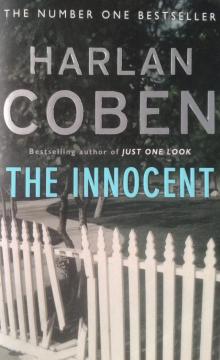 The Innocent
The Innocent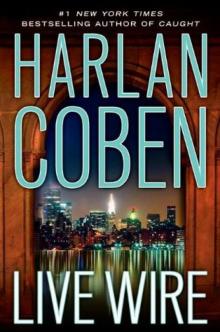 Live Wire
Live Wire Play Dead
Play Dead Drop Shot
Drop Shot Seconds Away
Seconds Away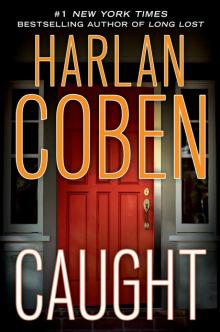 Caught
Caught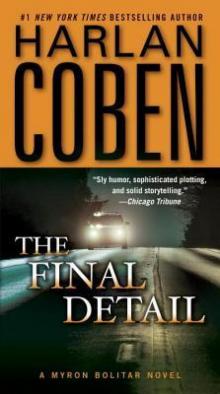 The Final Detail
The Final Detail Fade Away
Fade Away Home
Home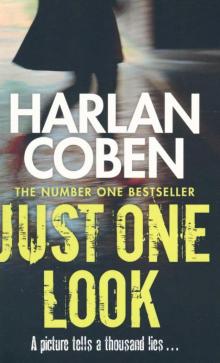 Just One Look
Just One Look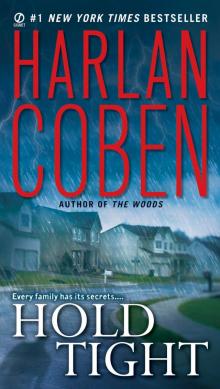 Hold Tight
Hold Tight Fool Me Once
Fool Me Once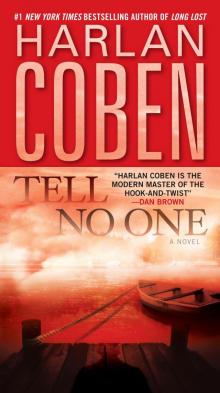 Tell No One
Tell No One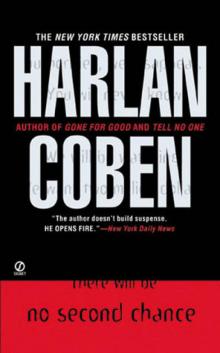 No Second Chance
No Second Chance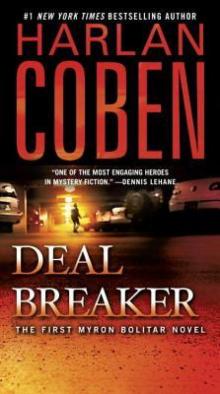 Deal Breaker
Deal Breaker Long Lost
Long Lost One False Move
One False Move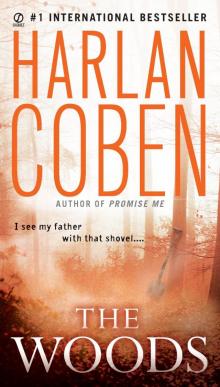 The Woods
The Woods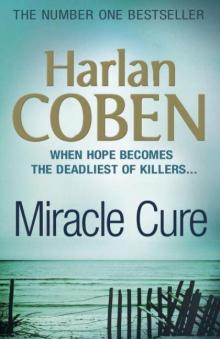 Miracle Cure
Miracle Cure Found
Found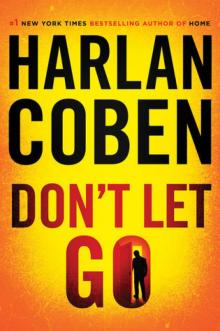 Don't Let Go
Don't Let Go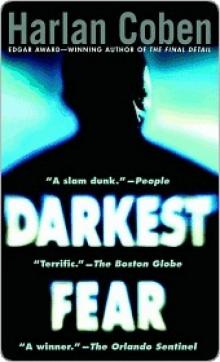 Darkest Fear
Darkest Fear The Stranger
The Stranger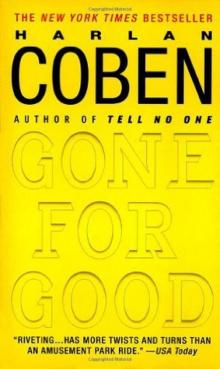 Gone for Good
Gone for Good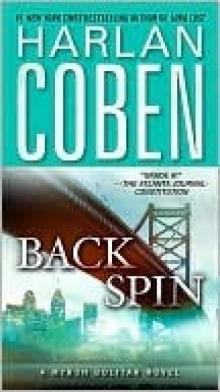 Back Spin
Back Spin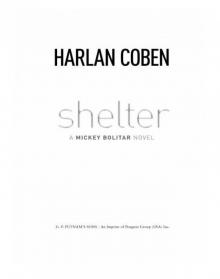 Shelter
Shelter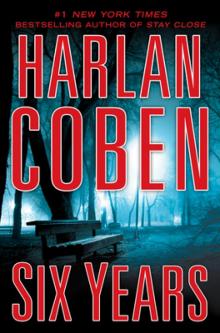 Six Years
Six Years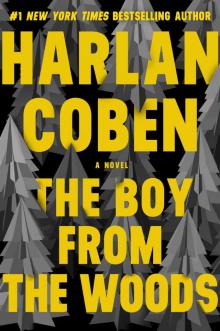 The Boy from the Woods
The Boy from the Woods Missing You
Missing You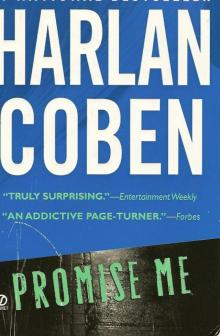 Promise Me mb-8
Promise Me mb-8 The Final Detail: A Myron Bolitar Novel
The Final Detail: A Myron Bolitar Novel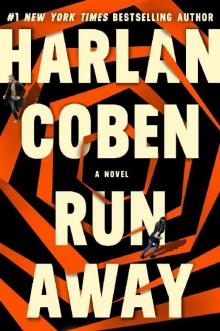 Run Away
Run Away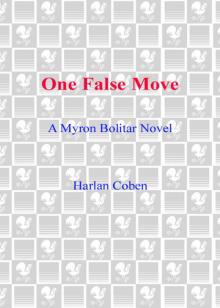 One False Move: A Myron Bolitar Novel
One False Move: A Myron Bolitar Novel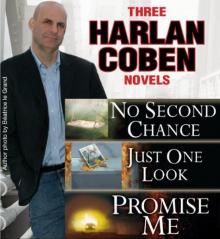 Three Harlan Coben Novels
Three Harlan Coben Novels the Woods (2007)
the Woods (2007) Tell No One (2001)
Tell No One (2001) the Innocent (2005)
the Innocent (2005)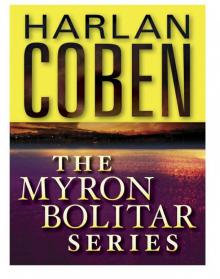 The Myron Bolitar Series 7-Book Bundle
The Myron Bolitar Series 7-Book Bundle Gone for Good (2002)
Gone for Good (2002) Caught (2010)
Caught (2010) Hold Tight (2008)
Hold Tight (2008)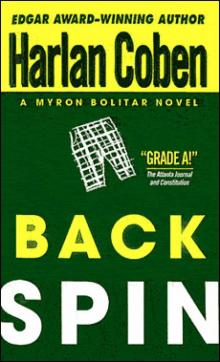 04 - Back Spin
04 - Back Spin Miracle Cure (1991)
Miracle Cure (1991) Harlan Coben 3 Novel Collection
Harlan Coben 3 Novel Collection Just One Look (2004)
Just One Look (2004)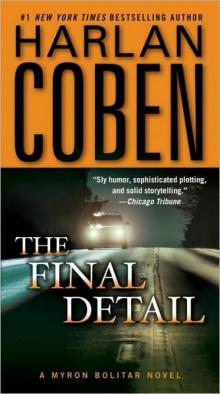 The Final Detail mb-6
The Final Detail mb-6 Play Dead (2010)
Play Dead (2010)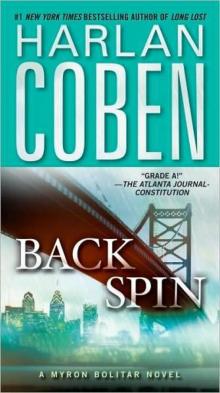 Back Spin mb-4
Back Spin mb-4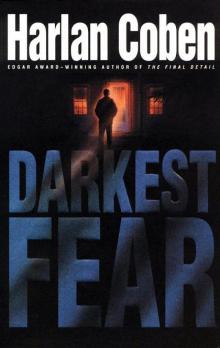 Darkest Fear mb-7
Darkest Fear mb-7